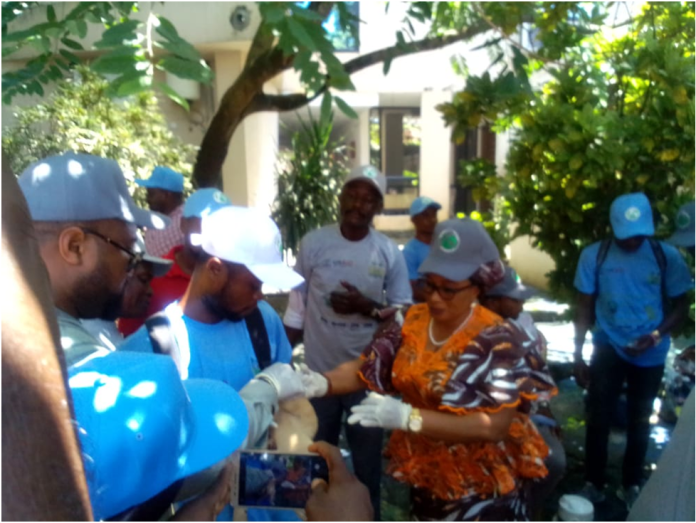By Abubakarr Harding
In scaling up efforts to deal with the health risk of contracting rabies as a result of the growing number of stray dogs in the country, the Government, with support from USAID – Breakthrough ACTION, the One Health Platform which consists of the Ministry of Health and Sanitation, Ministry of Agriculture & Forestry, Environment Protection Agency, Office of National Security & other partners commemorated World Rabies Day on Wednesday 28 September 2022 at the Family Kingdom Resort at Aberdeen on Freetown.
In his welcome address, the Permanent Secretary of the Ministry of Agriculture Ministry, Andrew L Sorie, stated that the World Rabies Day is a wonderful time to ponder about the virus adding that the symposium to be held will reflect on the work completed in the previous year and to commemorate the enormous victories in the fight against rabies.
The Permanent Secretary asserted that there is a variety of devoted professions with various responsibilities and approaches to the management of the disease furthering that being a zoonotic disease it brings together experts in both the management of human and animal diseases.
The Deputy Minister of Agriculture, Dr. Theresa Tenneh Dick, in her key note address mentioned that Rabies had been in Sierra Leone since antiquity but was isolated from the brain of a rabid dog at the Teko Central Veterinary Laboratory in Makeni, Northern Sierra Leone in 1949 maintaining that Rabies also existed in Kenema, Blama, and other parts of the country later found to be endemic with the virus.
She added that the lack of veterinary staff prevented the Government from developing policies on dog ownership and management, undertaking large-scale research and awareness-raising on rabies resulting in dogs receiving limited attention from their owners.
“Some could not feed their dogs, provide treatment nor pay for a rabies vaccine,” she underscored adding that with such an obvious gap, rabies continues to take its toll on both humans and dogs.
The Deputy Minister pointed out that to combat the menace, the Government focused on vaccinating dogs in major cities and outbreak communities providing high-cost rabies vaccines for affluent dog owners, while leaving dogs from low-income earners and the public unvaccinated.
Dr. Dick disclosed that the Rabies virus has led to the death of thirteen people from 1968 to 1973, which warranted the Government to vaccinate 4700 dogs in 1974 which in turn gave prominence to the control of rabies through a national vaccination programme of dogs which was short-lived due to the hosting of the Organization of African Unity (OAU) conference in the 1980s.
She continued that the Government diverted meager resources to the hosting leaving most Government departments unable to discharge their normal duties and service.
According to her, funding allocations to Government departments dwindled and development in the veterinary sector diminished hence the inability to provide basic veterinary infrastructure and vaccination exercise for dogs and cats.
She expressed the view that no doubt difficulties and hardship followed after the hosting of the OAU conference accompanied by political injustices which brought resentment to governmental policies among the population.
Highlighting the challenges, Dr. Dick stated that policies on dog ownership and management have been abandoned since the colonial era which has led to many stray dogs on the street and has been a threat to the human health.
The Communication Manager of the Environment Protection Agency, Mrs. Fatmata Bakar Sesay stated that as September 28 is been set aside to celebrate the world rabies day that they want to overemphasize and remind everybody about the rabies virus maintaining that until the world is free from rabies we all are not safe.
She said this year’s theme; “One Health, Zero Deaths” highlights the connection of the environment with both people and animals adding that the COVID-19 pandemic has shown that collaboration, coordination across all sector can be achieved.
“The integrated approaches shown in the global strategic plans for rabies and the road map are very relevant as they show the importance of working together optimally and collaboratively in facing the numeric challenges experienced in the Ebola and COVID-19 periods,” she said adding that it is therefore critical to work with stakeholders, people at community level to strengthen the country’s health sector and put all hands on deck to protect the environment.
It must be noted that Consultant Veterinarian, Dr. Gudus Jalloh, of the Sierra Leone Animal Welfare Society (SLAWS) has been on the campaign against stray animals and also on how to care for domestic pets. He has repeatedly solicited support from the MoHS, Ministry of Agriculture Livestock Division, the FCC and other partners, to lend support to rid the Freetown municipality and other parts of the country from increased stray animals, especially dogs and cats that are suspected to be carrying the rabies virus.




